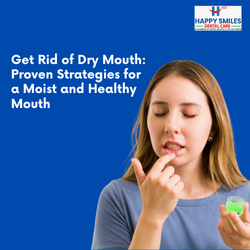Get Rid of Dry Mouth: Proven Strategies for a Moist and Healthy Mouth
Is your mouth constantly dry? Discover practical and effective tips on how to relieve dry mouth problems, understand the potential causes, and learn how to maintain a moist and healthy oral environment.
Finding Moisture: Effective Strategies to Relieve Dry Mouth Problems
That uncomfortable, parched sensation in your mouth, often accompanied by a sticky feeling, difficulty swallowing, or altered taste, is commonly known as dry mouth or xerostomia. While it might seem like a minor inconvenience, persistent dry mouth problems can significantly impact your oral health, making you more susceptible to cavities, gum disease, and infections. Thankfully, there are numerous effective ways to soothe a dry mouth and restore much-needed moisture. This comprehensive guide will delve into the various causes of dry mouth and provide you with actionable strategies to manage xerostomia symptoms and improve your overall oral comfort.
Pinpointing the Reasons Behind Your Dry Mouth Issues
Understanding the potential culprits behind your dry mouth issues is the first step towards finding effective solutions. Several factors can lead to a decrease in saliva production, including:
- Medications: A wide array of prescription and over-the-counter medications can have dry mouth as a side effect. Common culprits include antihistamines, decongestants, pain relievers, diuretics, and certain drugs used to treat depression, anxiety, and high blood pressure. For detailed information on medication side effects, consult resources like Happy Smiles Dental Hospital.
- Underlying Health Conditions: Certain medical conditions can directly impact saliva production. These include Sjögren’s syndrome (an autoimmune disorder), diabetes, rheumatoid arthritis, lupus, scleroderma, cystic fibrosis, HIV/AIDS, and Alzheimer’s disease.
- Cancer Treatments: Radiation therapy directed at the head and neck area can damage the salivary glands, often leading to long-term or permanent dry mouth. Chemotherapy can also cause temporary reductions in saliva flow.
- Dehydration: Not consuming enough fluids throughout the day is a simple yet significant contributor to dry mouth.
- Mouth Breathing: Chronic mouth breathing, whether due to nasal congestion, habit, or sleep apnea, can lead to significant oral dryness.
- Aging: While the aging process itself doesn’t necessarily cause dry mouth, older adults are more prone to experiencing it due to increased medication use and potential age-related changes in salivary gland function.
- Nerve Damage: Trauma or surgery involving the head and neck region can sometimes damage the nerves that control saliva production.
Practical Tips and Techniques to Alleviate Xerostomia
Fortunately, there are many proactive steps you can take to get relief from dry mouth. Here are several effective strategies for combating oral dryness:
- Frequent Water Consumption: Keeping a water bottle handy and sipping water regularly throughout the day is the most basic yet crucial step in managing dry mouth.
- Sugar-Free Oral Aids: Sucking on sugar-free hard candies or chewing sugar-free gum can stimulate saliva flow. Opt for mint or citrus flavors for a refreshing sensation. Ensure they are sugar-free to protect your teeth from decay.
- Artificial Saliva Products: Over-the-counter artificial saliva sprays, rinses, and gels can provide temporary lubrication and relief. Look for products containing ingredients like carboxymethylcellulose or glycerin.
- Humidify Your Environment: Using a humidifier, especially in your bedroom during the night, can add moisture to the air and help prevent your mouth from becoming excessively dry while you sleep.
- Nasal Breathing Focus: Make a conscious effort to breathe through your nose. If nasal congestion is a persistent issue, consider using saline nasal sprays or consulting a doctor to address the underlying cause.
- Dietary Modifications: Certain foods and beverages can exacerbate dry mouth. Try to limit or avoid:
- Caffeinated and Alcoholic Drinks: These can have a dehydrating effect.
- Acidic Foods and Beverages: These can irritate a dry mouth and erode tooth enamel.
- Dry, Crunchy, and Spicy Foods: These can be difficult and uncomfortable to swallow with a dry mouth.
- Avoid Tobacco and Alcohol-Based Mouthwashes: Smoking and using mouthwashes containing alcohol can further dry out your oral tissues. Resources for quitting tobacco use are available from the National Cancer Institute.
- Maintain Excellent Oral Hygiene: Dry mouth increases the risk of dental problems, so meticulous oral care is essential:
- Brush your teeth at least twice a day with a fluoride toothpaste.
- Floss daily to remove plaque and food particles.
- Consider using a fluoride mouthwash recommended for dry mouth.
- Regular Dental Checkups: Regular visits to your dentist are crucial for monitoring your oral health and managing dry mouth-related complications. Your dentist can also recommend specific products and strategies tailored to your needs.
- Discuss Medications with Your Doctor: If you suspect your medications are contributing to your dry mouth, discuss alternative options or dosage adjustments with your doctor.
By implementing these effective ways to soothe a dry mouth, you can significantly improve your comfort and protect your oral health. Remember that consistency is key, and it’s always best to consult with your dentist or doctor to determine the underlying cause of your xerostomia symptoms and develop a personalized management plan. A well-hydrated mouth is a healthier and happier mouth!




 Users Today : 14
Users Today : 14 Users This Year : 1321
Users This Year : 1321 Views This Year : 1735
Views This Year : 1735
